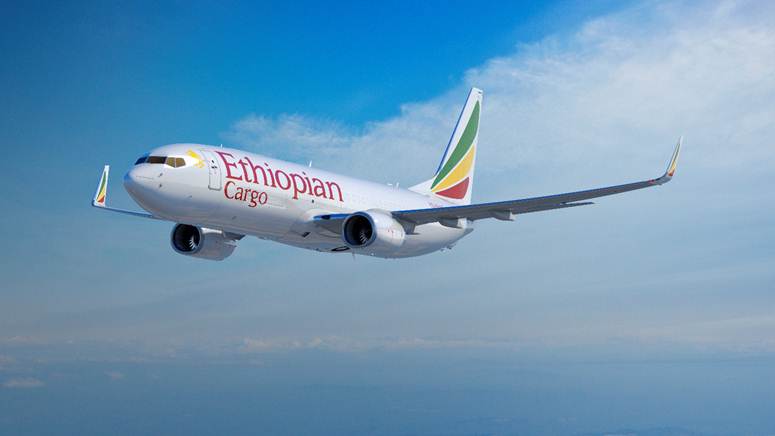Headline
No survivors on crashed Ethiopian Airlines flight: state TV

FILE: Ethiopian Airlines has taken delivery of its first B737-800 freighter, the first of its kind in the Ethiopian Cargo fleet mix, on March 01, 2019. (Photo: @flyethiopian/Twitter)
ADDIS ABABA, Ethiopia — An Ethiopian Airlines flight crashed shortly after takeoff from Ethiopia’s capital on Sunday morning, killing all 157 people thought to be on board, the airline and state broadcaster said, as anxious families rushed to airports in Addis Ababa and the destination, Nairobi.
It was not immediately clear what caused the crash of the Boeing 737-8 MAX plane, which was new and had been delivered to the airline in November, records show.
The state-owned Ethiopian Airlines, widely considered the best-managed airline in Africa, calls itself Africa’s largest carrier and has ambitions of becoming the gateway to the continent.
It said 149 passengers and eight crew members were thought to be on the plane that crashed six minutes after departing Addis Ababa on its way to Kenya’s capital. The crash occurred around Bishoftu, or Debre Zeit, some 50 kilometres (31 miles) south of Addis Ababa, at 8:44 a.m.
The airline later published a photo that appeared to show its CEO standing in the wreckage. Little of the plane could be seen in the freshly churned earth, under a blue sky.
“Tewolde Gebremariam, who is at the accident scene now, regrets to confirm that there are no survivors,” the post on social media said. “He expresses his profound sympathy and condolences to the families and loved ones of passengers and crew who lost their lives in this tragic accident.”
The plane had showed unstable vertical speed after takeoff, air traffic monitor Flightradar 24 said in a Twitter post. Visibility was clear.
State broadcaster EBC reported all passengers were dead and that they included 33 nationalities. An Ethiopian Airlines spokesman said 32 Kenyans and 17 Ethiopians were among the victims.
The Ethiopian prime minister’s office offered its “deepest condolences” to families.
The Addis Ababa-Nairobi route links East Africa’s two largest economic powers and is popular with tourists making their way to safari and other destinations. Sunburned travellers and tour groups crowd the Addis Ababa airport’s waiting areas, along with businessmen from China and elsewhere.
At the airport in Nairobi, worried families gathered.
“I came to the airport to receive my brother but I have been told there is a problem,” Agnes Muilu said. “I just pray that he is safe or he was not on it.”
“Why are they taking us round and round, it is all over the news that the plane crashed,” said Edwin Ong’undi, who had been waiting for his sister. “All we are asking for is information to know about their fate.”
Kenya’s transport minister, James Macharia, told reporters that authorities had not yet received the passenger manifest. He said an emergency response had been set up for family and friends.
“My prayers go to all the families and associates of those on board,” Kenya’s President Uhuru Kenyatta said.
Records show that the plane was new. The Planespotters civil aviation database shows that the Boeing 737-8 MAX was delivered to Ethiopian Airlines in mid-November.
In a statement, Boeing said it was “deeply saddened” to hear of the crash and that a technical team was ready to provide assistance at the request of the U.S. National Transportation Safety Board.
In October, another Boeing 737-8 MAX plunged into the Java Sea just minutes after taking off from Jakarta, Indonesia’s capital, killing all 189 people on board the plane Lion Air flight. The cockpit data recorder showed that the jet’s airspeed indicator had malfunctioned on its last four flights, though Lion Air initially claimed that problems with the aircraft had been fixed.
The last deadly crash of an Ethiopian Airlines passenger plane was in 2010, when the plane crashed minutes after takeoff from Beirut killing all 90 people on board.
Sunday’s crash comes as the country’s reformist prime minister, Abiy Ahmed, has vowed to open up the airline and other sectors to foreign investment in a major transformation of the state-centred economy.
Ethiopian Airlines has been expanding assertively, recently opening a route to Moscow and in January inaugurating a new passenger terminal in Addis Ababa to triple capacity.
Speaking at the inauguration, the prime minister challenged the airline to build a new “Airport City” terminal in Bishoftu — where Sunday’s crash occurred.





















